| |
|


FRIDAY, JULY 18 Temple Solel Shabbat at Beach
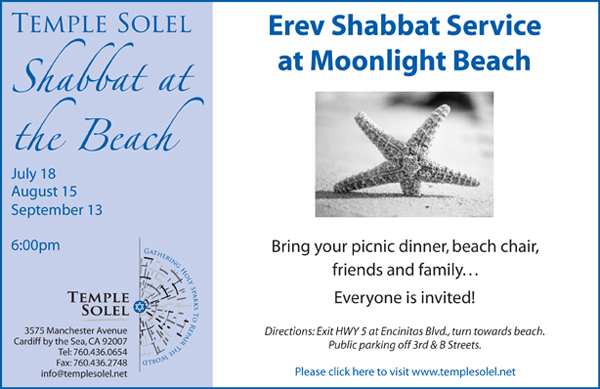

SATURDAY, AUGUST 2 Temple Emanu-El Joshua Nelson Concert


MON., SEPT. 29-THURS., OCT. 9


THE VIEW FROM JINSA
Iran's bad week: gas deal with French Total sours, missile test lacks credibility
By Shoshana Bryen
 WASHINGTON, D.C.—It wasn't a particularly good week for Iran. WASHINGTON, D.C.—It wasn't a particularly good week for Iran.
French oil giant Total is pulling out of a planned investment in a huge gas project in Iran's South Pars gas field. Total, one of the few companies in the world thought to have the technology to exploit Iran's gas reserves, is the last of the major Western players to quit; Royal Dutch Shell and Repsol of Spain withdrew last year. The Financial Times says it is now unlikely that Iran will be able to significantly boost its gas exports before sometime late in the next decade.
Then, there was a lot of giggling on blogs ["Iranians S**K at Photoshop"] about Iran's faked picture of its missile launch; they stuck an extra missile in the photo distributed through their news agency. Agence France Presse, The Guardian and The New York Times ran with it before the duplicity was discovered. Mark Fitzpatrick of the London-based International Institute for Strategic Studies, was cited in Middle East News Line saying Teheran also doctored a photo of a Shihab-3 launch on the website of Iran's Islamic Revolutionary Guards Corps.
On top of which, Israeli analysts said the Shihab-3 they saw on television was an old model and that Iran has failed to flight-test any missile with a 2,000 km range. Uzi Rubin, a leading Israeli defense analyst and former missile defense chief, said, "The Iranians have a tendency to exaggerate to a certain extent the capabilities of their missiles. From what I saw, this is an old version of the Shihab-3, and contrary to their claims, it is not capable of reaching 2,000 kilometers, rather 1,300 kilometers." The Christian Science Monitor reported that Americans and Europeans agree that sanctions have had some effect on Iran's capabilities.
But don't laugh too soon. Iran's acquisition of nuclear capability would be the biggest problem it presents, but not the only one. The United States and Israel currently face deadly threats from Iran in Iraq and through Iran from Hezbollah in Lebanon.
Iran has upgraded the rockets they are supplying to Iraqi Shiite militias - particularly the Mahdi Army, against which Iraqi and American forces have been having great success. Militia members are taught to assemble Improvised Rocket Assisted Munitions (IRAMs), a 107 mm rocket packed with hundreds of pounds of explosives (there are reports that Hezbollah is doing the training). "It's incredibly deadly and so cheap to make," an official said. The U.S. military acknowledged that IRAMs have killed three American soldiers this year. In June, five IRAMs being driven toward an American base for launching fired prematurely (what the Israelis ironically call a "work accident"), killing at least 18 Iraqis, injuring 29 and damaging 15 buildings - an indication of enormous lethality.
In Israel, public radio cited intelligence officials as telling the Israeli government that Hezbollah now has an arsenal of 40,000 rockets ready to be fired at Israel, three times more than it had when Israel went to war in Lebanon two years ago. The rockets and the training for use come from Iran through Syria.



FROM THE GATES OF THE NEGEV
Shaliach tells fellow kibbutzniks about his goodwill assignment in Tulsa, Oklahoma
By Ulla Hadar
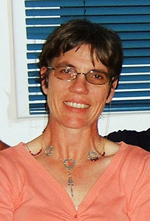 KIBBUTZ RUHAMA, Israel --Itai Lavi, a native of this kibbutz, has been on a home visit for a couple of weeks, sharing with family and friends information about the work he does as a shaliach (emissary) in Tulsa—a position quite similar to that filled by Eyal Dagan in San Diego. KIBBUTZ RUHAMA, Israel --Itai Lavi, a native of this kibbutz, has been on a home visit for a couple of weeks, sharing with family and friends information about the work he does as a shaliach (emissary) in Tulsa—a position quite similar to that filled by Eyal Dagan in San Diego.
For the last three years he and his wife Miki and two daughters Peleg (13) and Yuval (6), have lived in the Oklahoma city, which is the second largest in the state of Oklahoma and the 45th largest in the united States. Of the estimated 382,872 residents, 2,650 of them are Jews. The city has two synagogues, one Conservative (B'nai Emmunah) and one Reform (Temple Israel).
Tulsa also houses the Sherwin Miller Museum of Jewish Art which is more than an art museum. It is designed to be a moving experience that deepens understanding of the Jewish people while uniting all cultures through an appreciation of their common history and values.
Lavi explained:
"Tulsa was one of the first communities in the United States to partner with Israel – from the first days of the state of Israel, from Ben-Gurion, who visited Tulsa, through every Israeli government.” He described Tulsa as a “small- in- number – but great-in-heart –Jewish community."
"Tulsa partnered with Tiberias long before the term P2K (Partnership 2000) was invented and has kept this partnership vibrant and meaningful – an example for other partnership communities all around Israel and the U.S.A," Lavi said.
"We have a great challenge of strengthening the Jewish world, our tradition, and our younger generation. Our number is not on the rise: for many years now, too many people are getting farther away from their Jewish roots. Anti-Semitism is still here, and rising in different places around the world. Israeli number of aliyah versus the emigrants--people who have left the country--has been even in the last couple of years – for the first time ever. Increasing aliyah is a great and difficult challenge. Strengthening democracy in Israel, giving a better chance to the poor people in Israel, reaching out and developing Negev and Galil – these are some of the challenges we are facing and dealing with."
The shaliach program reaches out to both Jews and non-Jews through a variety of programs. These include:
- Lectures and presentations in churches, civic organizations, universities, public and private schools throughout Oklahoma.
- Teaching courses at the Institute of Adult Jewish Studies and Midrasha.
- Making presentations to the Jewish community, including Congregation B'nai Emmunah, Temple Israel, and the CSJCC's Retired Men's Club.
- Participating in special events, most notably, ShalomFest, KidsWorld, and the International Fair at Tulsa Community College.
- Festival Israel - an ambitious way for Tulsa to mark Israeli Memorial Day (Yom Hazikaron) and Israel's Independence Day (Yom Ha-Atzmaut). More than 2,000 Jewish and non-Jewish Tulsans come to Zarrow Campus to commemorate those who gave their lives in defense of Israel, and then to celebrate her independence during an afternoon of food, culture, entertainment, and activities.
*Numerous cultural and educational community events. These include the Israeli Scholar-in-Residence program.
The shaliach also helps Tulsans build and plan their itineraries for trips to Israel. He provides help and information regarding traveling, studying, and working in Israel. He advises people about various scholarships available for different programs in Israel.



REFLECTIONS
G. I. Joe’s choices reshape the battlefield
By Sheila Orysiek
 SAN DIEGO--When "Everyman" G.I. Joe looked up at the sky it looked the same as over his family’s ranch in Arizona outside of Phoenix. The wind sculpted rock formations that swam in a sea of dry brown crusty earth and sand looked the same, too. But when he looked into the face of the interpreter who accompanied his squad, Joe knew he was in Afghanistan and he was a soldier in the United States Army. SAN DIEGO--When "Everyman" G.I. Joe looked up at the sky it looked the same as over his family’s ranch in Arizona outside of Phoenix. The wind sculpted rock formations that swam in a sea of dry brown crusty earth and sand looked the same, too. But when he looked into the face of the interpreter who accompanied his squad, Joe knew he was in Afghanistan and he was a soldier in the United States Army.
His squad had been pinned down behind a wall by enemy sniper fire coming from a derelict house across the road. Two soldiers had already been killed and one was wounded and needed medical attention. After a brief discussion, he and his buddies under covering friendly fire ran across the road and into the back of the house. They made it safely and then darted from room to room. Joe was the one who entered the room from which the sniper was shooting.
Through the interpreter, he ordered the sniper to drop his weapon and put up his hands. As the man did so, he turned around and faced Joe. There wasn’t much to see, his face was covered by a swath of cloth from his turban. While keeping his weapon on his captive, Joe pulled out of his pocket a pair of manacles and secured the man’s wrists. Breathing a sigh of relief that the sniper was secured, he lowered his weapon.
Joe had been briefed on the recent United States Supreme Court decision which stated that an enemy combatant when taken into custody even on the battlefield can claim the protection of a writ of habeas corpus under the United States Constitution. Simply put - an enemy combatant captured and held by the United States must be told why he is being held, a charge has to be made, and thus there has to be evidence of a crime committed to support that charge. After putting on a pair of plastic gloves, Joe pulled from his back pack a large plastic bag into which he put the sniper’s rifle, then tagged and sealed it.
Next he pulled out a digital camera and photographed the sniper, full face and profile. He downloaded the picture into a hand held device and e-mailed it to headquarters. The interpreter asked the man’s name and Joe wrote it on a plastic band which he put on the captive’s wrist. Then he photographed the room from which the sniper had been shooting. Using his specialized GPS he traced the trajectory of the bullets from the room to the wall behind which Joe and his squad had been pinned down.
A small kit which contained a sterile cotton swab was used to pick up cells from the sniper’s mouth, and then labeled and sealed a plastic pouch. If the sniper had given a false name, the DNA evidence would be available.
On the way to the command post, Joe informed the sniper through the interpreter that he had the right of habeas corpus and could request an attorney at government expense to enforce this right. He also informed him he would receive a religious text of his choice, food consonant with his religious beliefs, adequate time to pray, and any other accoutrement of his faith as well as counsel from an acceptable religious leader.
After leaving the prisoner at the command post, he went back to the wall and found some bullets from the sniper’s gun buried in stone which he dug out and put in another plastic bag as evidence. Having done all this with great care, Joe sat down with his back against the wall and wrote out his report on his hand held text message device. He noted the time of day, weather, visibility, names of everyone involved, type of wounds sustained, length of the entire action, what he saw upon entering the room where the sniper had been, his demeanor, condition and any other details he could remember.
He knew he had to provide evidence that a crime had been committed - not the guilt of any particular person in committing that crime - but simply that a crime had been committed. Joe also knew that if evidence of a crime was not provided, the sniper would go free - free to once again shoot at his buddies. So, he conscientiously tried to fulfill all the legal requirements demanded by United States law; law which had been developed through the centuries to protect citizens against unlawful restraint by the government but which now included enemy combatants. While Joe was thus occupied everyone politely waited - on both sides of the combat line - enemies and friendlies. When he was done he gave a signal and the battle started up again.
Habeas corpus is an important concept to keep the king/government from imprisoning anyone at whim. A crime has to have been committed - a crime as described in the legal code of the country/province/city, etc. There are other codes of law: military and ecclesiastic are two examples. In England, from which much of our law derives, common, equity and ecclesiastic (religious) codes lived side by side, one influencing the other.
In the end - or maybe I should say in the beginning - law is mostly derived from religious law whether directly (the Deity’s words - “Thou Shalt not Kill”) or through the king as G-D’s representative. The Hebrew Bible is the basis for much of that law - and we wrote the book. An interesting example of the interaction of the Bible - Torah - on the law is the provision for sanctuary cities when someone is killed. The accused is given a place to flee as protection from an angry crowd lest he not be guilty. This led directly to the idea of specific places being used for sanctuary.
All this is positive in forwarding a civilized society - but was never meant to be applied to combat situations. Jurists have recognized that the legal code which applies to civilians cannot apply to the battlefield. The sixth and eighth Commandments are ipso facto violated by the very nature of the battlefield. We try to ameliorate this with institutions such as the Geneva Convention - but a war by its very nature kills people and takes/breaks things. Generally speaking, the ordinary foot soldier who becomes a prisoner of war is not charged with a crime nor set free until hostilities are over.
What does the Constitution say?
Article I, Section IX, United States Constitution: The Privilege of the Writ of Habeas Corpus shall not be suspended unless when in cases of rebellion or invasion the public safety may require it.
The use of the word “privilege” rather than an enumerated or unenumerated “right” is interesting. And, surely, freeing an enemy combatant endangers public safety? And, surely, we have already experienced an invasion - on Sept. 11, 2001?
We have devised two distinct enforcing entities: the military and the police. The police are meant to enforce the law within the country, among civilians. The military is meant to enforce external policy - defensively or offensively.* The police are subject to the same laws as all other civilians and are given the tools to collect evidence of a crime and/or guilt/innocence. The soldier is subject to the military code, prosecuted by his peers even in cases of egregious offense - purposeful killing of innocent civilians - such as My Lai.
This doesn’t mean that soldiers can act as indiscriminate killers, but the law does recognize that the normal collection of evidence as proof of guilt - either of the soldier or the enemy combatant - can’t apply in the same way to the battlefield. The environment is entirely different. However, the recent 5-4 decision of the United States Supreme Court imposes the same rules - evidence to substantiate the perpetration of a crime - upon the soldier who is not equipped to supply such evidence. He’s in the middle of being shot at.
So, now instead of having the political operatives in the White House (such as during the Johnson administration - Vietnam War) cherry picking military targets, we have the five justices of the Supreme Court organizing the battlefield. The outcome may very well be much different than the Court intends.
Maybe the hypothetical Joe will just shoot the sniper when he walks into the room and in so doing insure that particular enemy combatant will not ever be set free to shoot at him or his buddies again.
*An exception is made for insurrection such as when Governor Faubus (D-Arkansas) attempted to block integration by using the Arkansas National Guard and President Eisenhower responded by federalizing it to enforce the Supreme Court decision in Brown versus Board of Education.


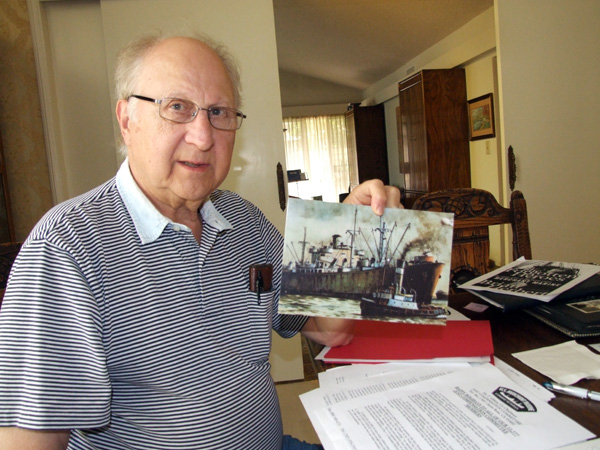
THE JEWISH CITIZEN
World War II-era Merchant Mariners seek compensation for lost G.I. Bill privileges
By Donald H. Harrison
 SAN DIEGO—Sheldon Merel, the cantor emeritus of Congregation Beth Israel, is among the thousands of men and women now in their 80’s who risked their lives in service of the United States during World War II but were excluded from receiving the GI benefits that for many veterans after World War II were passports to the middle class. SAN DIEGO—Sheldon Merel, the cantor emeritus of Congregation Beth Israel, is among the thousands of men and women now in their 80’s who risked their lives in service of the United States during World War II but were excluded from receiving the GI benefits that for many veterans after World War II were passports to the middle class.
The veterans who were included in the GI Bill of Rights—whether they faced enemy fire or stayed stateside in an office job—were eligible to receive low interest loans to buy homes, go to college, train for new jobs, and, in short, to have the government help them begin their lives anew in recognition for the service that they gave to their country.
Those who had served in the regular U.S. Armed Forces—the Army, Navy and the Marines—were the lucky veterans eligible for the GI Bill of Rights In contrast, Merel and approximately 10,000 of his compatriots still living had served in the U.S. Merchant Marine, and their sacrifices were not rewarded. They were the “civilians” who risked their lives in the war theatre, steaming in famed “Liberty Ships” through waters infested with enemy submarines to supply U.S. armed forces and their allies with military equipment, grain, fuel, even personnel. Thousands of Merchant Mariners were killed or maimed when German or Japanese torpedoes sunk their ships.
Typically, Navy gunners served with the civilian Merchant Marine on the Liberty Ships, with both categories of fighters facing identical dangers. But when the war ended, those who were Navy personnel received the G.I. Bill; while those who were “civilians” were left out.
Why this happened is a matter of debate. Some say it was because Merchant Mariners often received higher salaries than Armed Forces personnel—a contention that Merchant Mariners contest, pointing out that they didn’t receive salaries for the times before and after their voyages, only when they were on their ships.
Some suggest it was because Merchant Mariners were not ordered into combat as members of the Armed Forces were; it was the Mariners’ choice whether or not to accept assignment on a ship. And when a voyage was completed, it was their choice to sign on for another voyage or turn to other civilian pursuits. Armed Forces personnel had no such choice.
There was other speculation about why the Merchant Marine had been excluded. Many of the ships were unionized at a time when some leading politicians were dead set against the labor movement. The Merchant Marine was racially integrated long before the Armed Services was—allowing African-Americans to earn their way into officer ranks.
One thing about which there is no debate: the Merchant Mariners risked their lives for their country, and often paid the ultimate price.
It was clear to many that Merchant Mariners deserved some compensation for their sacrifices, some thank you for their life-risking service. Among those who made such a point was President Franklin D. Roosevelt, who, in approving GI Bill of Rights legislation, remarked that Congress ought to extend similar benefits to the Merchant Marine—advice that was never taken.
During the 1980s, through a combination of court and administrative decisions, Merchant Mariners who served during World War II were recognized as veterans, meaning from that time on they could utilize veterans hospitals, be buried in veterans cemeteries, and collect other benefits that long had been available to Armed Services personnel.
But what about the lost 40 years? Shouldn’t the Merchant Mariners—who had been shut out of the GI Bill, missing all the opportunities it extended—in some way be compensated for those 40 years of neglect?
Enter Congressman Bob Filner (Democrat, San Diego), currently chairman of the House Committee on Veteran Affairs, and Senator Benjamin Nelson (Democrat, Nebraska). They introduced companion bills to provide a pension of $1,000 a month for a period of ten years to Merchant Mariners who faced hostile action during World War II. Expected to cost a total of $120 million in the first year, and less in each ensuing year because of the high death rate among octogenarians, Filner’s bill (HR 23), known as the “Belated Thank You To the Merchant Mariners of World War II Act of 2007,” won approval in the House of Representatives.
In the U.S. Senate, the companion bill (S961) initially appeared to be in for similar smooth sailing. Fifty-nine of the 100 U.S. Senators co-sponsored the bill, including California’s two U.S. Senators Dianne Feinstein and Barbara Boxer, presumptive Democratic presidential candidate Barrack Obama of Illinois and his former rival Hillary Clinton of New York. Furthermore, seven of the 15 members of the Senate Committee on Veteran Affairs were among the co-sponsors, including Democrats Obama, Patty Murray of Washington, Sherrod Brown of Ohio, and Jon Tester of Montana; Independent Bernie Sanders of Vermont, and Republicans Arlen Specter of Pennsylvania and Kay Bailey Hutchison of Texas.
Conspicuously absent from the list of supporters were the chairman of that Senate Committee, Daniel Akaka (Democrat, Hawaii) and its ranking Republican Richard Burr of North Carolina. They proved to be the rocks of Charybdis and Scylla upon which the S961 appears shipwrecked. After a May 2 hearing at which various bills augmenting benefits veterans were considered, S961 stayed in committee—without a formal vote—whereas other measures were marked up and sent along to the floor.
Opponents to the legislation all paid tribute to the service of the Merchant Marine. However, they said, it was not fair that Merchant Mariners should receive benefits exceeding that of some disabled veterans. Furthermore, they said, there were other classifications of civilians who fought for their country—the Flying Tigers, for example—who were not included in the bill. Providing the Merchant Marine with benefits could open the floodgates to other classes of veterans seeking benefits.
Cantor Merel and his fellow Merchant Mariners now are racing against two clocks to see if their proposed benefits can be actualized—the bigger clock is the life clock; octogenarians have limited life expectancies. A smaller clock is the congressional calendar. If the bill cannot be moved to the Senate floor before Congress adjourns, the process will have to be started all over again.
Accordingly, Merel and his compatriots--led in a national grassroots effort by Ian Allison of Santa Rosa, California, and Gerry Starnes of Florida--are attempting to contact as many senators as possible to get them to amend the bill into another that already has reached the Senate floor or to send S961 to the Senate floor with or without a recommendation from the Senate Veteran Affairs Committee.
There is considerable focus on Senate Majority Leader Harry Reid of Nevada, who could arrange for the bill to be amended into another. Letter writing campaigns also are being directed at those senators who have not yet taken a stand, among them John McCain of Arizona, the presumptive Republican nominee for president.
*
I recently met with Cantor Merel at his Del Cerro home to learn about his service in the Merchant Marine, and to pose to him a question that was uncomfortable to ask. He and his wife Marcie seem to live comfortably; do they really need $1,000 a month in taxpayer money at this point in their lives?
“Frankly it would be a great help,” Merel, 84, responded. “I am not retired in great style. Our biggest asset is our home, and that doesn’t bring us money, it only costs us money to maintain. My personal story is that my pension is very small. Social Security is very important to our income, between Marcie and me. I have been a pioneer all my life. I was a pioneer in the Reform cantorate; I didn’t have a pension plan for seven years of my career, and then when it started, when I first had a pension plan, I was making only $9,000 a year. So in a sense, I am getting by okay, but this would help.”
Furthermore, Merel said, “it will also be a help for guys who are in more dire straits than I am. And there is a principle involved too; we got screwed, because of some technical glitch in the original legislation. We were the lifeline of the war; without us, the war could not have been won. And there is a lot of literature on that.”
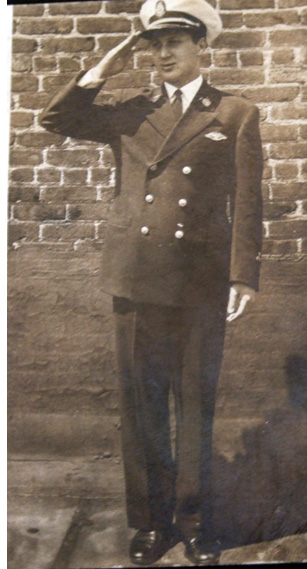 Merel (pictured at right) enrolled at the New York Maritime Academy at Fort Schuyler in the Bronx, from which upon graduation he received the choice of entering the Merchant Marine or being commissioned as a Navy officer. He chose the Merchant Marine, and shipped out on the SS Raymond V. Ingersoll, which like all the mass-produced Liberty Ships weighed a little more than 10,000 tons. It had been named for a former attorney general of Illinois, who had been a well known 19th century speech maker for the Republican party. Ironically, given Merel’s later entry into religious life as a cantor, Ingersoll was perhaps most controversial for poking fun at religion and advocating humanism. Merel (pictured at right) enrolled at the New York Maritime Academy at Fort Schuyler in the Bronx, from which upon graduation he received the choice of entering the Merchant Marine or being commissioned as a Navy officer. He chose the Merchant Marine, and shipped out on the SS Raymond V. Ingersoll, which like all the mass-produced Liberty Ships weighed a little more than 10,000 tons. It had been named for a former attorney general of Illinois, who had been a well known 19th century speech maker for the Republican party. Ironically, given Merel’s later entry into religious life as a cantor, Ingersoll was perhaps most controversial for poking fun at religion and advocating humanism.
As a Third Engineer, Merel stood a watch of four hours over the ship’s reciprocating engines, then had eight hours off duty. His first voyage brought guns, armored tanks and food to Naples, Italy; and his second tour, on the same ship, was to Southern France. Thereafter, he signed onto an oil tanker. He said that whereas the Liberty ships usually crossed the Atlantic in well-protected convoys, with the trips taking 30 days at the slow speed of 10 knots; the oiler was at least twice as fast, and able to outrun submarines. So it crossed the ocean without convoy. “We went to England, and unloaded the oil, and it was a real fast turnover,” he recalled. “We loaded seawater for ballast as there was nothing to take back, and we headed home.” Then he went to upgrade school, passed an examination, and was promoted to Second Engineer.
From his home in New York, Merel transferred to Galveston, Texas, where he signed onto a grain ship. He still can remember how his allergies acted up when the grain was poured into the holds. They carried their cargo to Bizerte, Algeria, and while there, he suffered an attack of appendicitis. He was treated by a doctor of the French Foreign Legion, who had him transferred to a French naval hospital for removal of the appendix. “I was there for about two weeks, and no one spoke English at the French naval hospital,” recalled Merel. Patients were allowed to have their spouses live at the hospital, and the husband of one female patient spoke a little English. “They gave me ether, and I was a little agitated, and he said to me, in broken English, ‘do not worry, for you it is all over.' I shall always remember that."
After recuperating in Tunis, Merel shipped back to the United States, the war having ended. “The moment my ship hit the port in the United States my pay stopped,” he said. “I was given an honorable discharge and I went back to college (CCNY). My dream had been to go to a college out of state, but with no GI Bill of Rights, there was no way that I or my family could afford it.”
In his four voyages across the Atlantic, Merel was one of the lucky ones, never coming under hostile fire. Another Jewish San Diegan, Herman “Hank” Rosen, was far from being so lucky in his Merchant Marine career. As described in his book, Gallant Ship, Brave Men, Rosen’s Liberty ship the U.S.S. John Drayton had been torpedoed on April 21, 1943 off the coast of Africa. He was among 24 Merchant Mariners who got into a lifeboat, but after a 30-day ordeal, only five of them survived.
The men in the lifeboat broiled during the day, and froze at night. There was insufficient food. Rosen had lost 50 pounds—from 140 to 90—by the time he was rescued. Nineteen of his shipmates had died of malnutrition and exposure.
In his testimony before the Senate Committee on Veteran Affairs, Filner stated: “The Merchant Mariners became the forgotten service. For four decades, no effort was made to recognize the contribution made by this branch of the Armed Services. The fact that Merchant Seamen had borne arms during wartime in the defense of their country seemed not to matter. The result of being left out of the G.I. Bill meant that the Mariners could not buy a home or go to college, as their counterparts in service were doing. Without college education, the jobs that were open to them paid significantly less and were less fulfilling in many cases. It was impossible for them to become a doctor, lawyer, teacher, engineer. And it was impossible to purchase a home, one of the stepping stones to the middle class. My father was a World War II veteran and his ability to buy a home for our family changed our lives.”
Filner continued: “The average age of Merchant Mariner veterans is now 82. Many have outlived their savings. A monthly check to compensate for the loss of a lifetime of eligibility for the GI Bill would be of comfort and would provide some measure of security for these older veterans, many of whom are living on meager funds.”


AMAZING STORIES OF JUDAISM
The wily machinations of the yetzer hara
By Rabbi Baruch Lederman
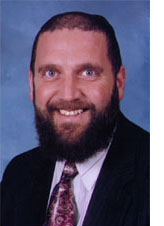 SAN DIEGO—There once was a fellow who ran a food delivery service. He would go to the market for you and buy groceries. For his trouble he would receive 15% of the total grocery bill. There SAN DIEGO—There once was a fellow who ran a food delivery service. He would go to the market for you and buy groceries. For his trouble he would receive 15% of the total grocery bill. There
was one thing about his business that nobody knew. He cheated his clients by padding the bill. He would tell the unsuspecting consumers that the cost of the food was greater than
it actually was, and he would keep the difference as extra profit.
Once, a client wanted to accompany him to the market to see what it was like. The fellow didn't want this, because he didn't want the client to see the true prices and realize that he
was overcharging. He said to the client, "The market is hot and noisy and smelly. It's not a place you want to go to." The client didn't go.
Another client asked to go to the market and again the fellow tried to talk him out of it; but the client was insistent. The fellow had no choice but to take him to the market. While there,
the fellow engaged him in conversation about every topic under the sun - food, finance, fashion - whatever it took to distract him so he would notice the prices. It worked. The client
was so engrossed in conversation; he didn't even look at the prices.
A third client asked to go to the market. The fellow tried to dissuade him from going, and when the client insisted, the fellow tried to distract him with witty repartee; but neither of
these tactics worked. The client saw that the prices in the market were not at all the same as the prices being charged. The fellow explained to the client that those prices didn't
apply to him. His merchandise was a different quality, hence fetched different prices.
The Yetzer Hara (evil inclination) works the same way. If we decide to go to shul, or attend a shiur (Torah class); the Yetzer Hara tries to convince us not to go. "It's raining outside,
stay home and relax. The Shul is hot and crowded. Your family needs you at home."
If we overcome the Yetzer Hara and go, the Yetzer Hara tries to get us distracted so as not to pay attention. We talk about politics, stock market, sports, and/or daydream during
davening. We fall asleep during the sermon or shiur.
If we do pay attention, the Yetzer Hara convinces us that everything we heard, read and experienced does not apply to us. "This lofty Dvar Torah only applies to special holy
tzaddikim (righteous people), not me. This sermon only applies to hard core, low life sinners, not me."
These are the wiles of the Yetzer Hara. We must be on our best game to overcome this trickster. And when we do overcome him, we need to be prepared for a trickier trick.
Dedicated by Yisroel & Miriam Perkal in honor of their children Naftali, Bryna, Zev, Shlomo, Chaim, Zechariah, & Dov. Dedicated by Aryeh & Rena Greenberg and Esther Sarah, Bryna, Dovid, & Shlomo Baruch in honor of their new baby Chaya Devorah.

A bissel sports trivia with Bruce Lowitt
 CLEARWATER, Florida— Q: Who is the losingest coach in history? (A) Red Auerbach; (B) Red Holzman; (C) Red Klotz (D) Red Buttons CLEARWATER, Florida— Q: Who is the losingest coach in history? (A) Red Auerbach; (B) Red Holzman; (C) Red Klotz (D) Red Buttons
Background: He owns the Washington Generals, the basketball team that tours with the Harlem Globetrotters. He also played point guard for the Generals until age 62. His teams (he also owned the New York Nationals, another foil for the Globetrotters) won six games and lost more than 13,000.


ADVENTURES IN SAN DIEGO JEWISH HISTORY
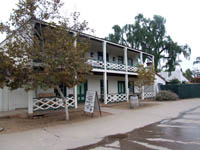
Robinson-Rose House
|
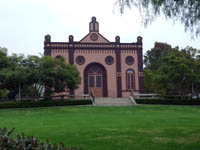
Old Temple Beth Israel |
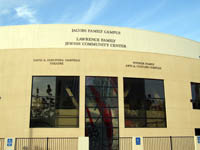
Lawrence Family JCC |
Editor's Note: We are reprinting news articles that appeared in back issues of various San Diego Jewish newspapers. You may access an index of the headlines of those articles by clicking here. You may also use the Google search program on our home page or on the headline index page to search for keywords or names.
Lasker Lodge B.B.
From Southwestern Jewish Press, July 17, 1947, Page 5
On August 2ndand 3rd the local men and women of B’nai Brith members will play hosts to the Southern California Council of B’nai B’rith. Headquarters will be maintained at the Imig Manor Hotel and the week end festivities will start off with a gala boat ride on Saturday evening, with music, fun and light refreshments being served. On the following morning, a breakfast will be held at the Imig Manor for all men visitors and local members at 8:30 a.m. followed by a morning meeting which will adjourn at 1:00 p.m. at which time a luncheon will be held.
Dr. Bernard Lavine of Los Angeles, president of the Council, will preside.
All Lasker Lodge members are urged to attend these activities and bring your wife or girl friend along for the boat ride as a grand time is assured. Further information may be secured by contacting Ed Breitbard at F.3124 or Dave Block at Main 0194.
Jewish Labor Com.
From Southwestern Jewish Press, July 17, 1947, Page 6
The wonderful attendance at the annual picnic sponsored by the Jewish Labor Committee on Sunday, July 6th, at Pepper Grove in Balboa Park turned out to be a huge success. Once again the deep response of our San Diego Jewry to their unfortunate and destitute brethren in Europe and the generous response of the members and their friends was indeed an expression of praise for the work the Jewish Labor Committee carries on to relieve and rebuild the physical and cultural life of the surviving Jews overseas and the marvelous work in combating anti-semitism in our country.
The turkey dinner was delicious and it was prepared and served by a very able committee. The merchants who contributed so generously and to all committees and participants who helped to make this worthy effort the huge success it was are very sincerely thanked for all their fine efforts.
Birdie Stodel B.B.
From Southwestern Jewish Press, July 17, 1947, Pages 6, 8
On last Monday, July 14th, the Auxiliary was honored to have as its guest speaker for the day, Rabbi Baruch Stern, who spoke on “The Jewish woman.” Rabbi Stern was a brilliant speaker and everyone in attendance greatly enjoyed hearing him. Many were moved to tears as he recounted some of the great achievements attainted by modern and historical Jewesses. The Auxiliary wishes to take this means of publicly thanking Rabbi Stern for a most enlightening afternoon.
A package has been sent to the adopted family in Hungary and it is expected that a communication will be received shortly as to the ages and sizes of the clothes needed for members of the adopted family. All members have not responded as well as expected in bringing canned goods to the Temple Center and it is urged that when the Chairmen, Edythe Bennett or Ruth Brav, call upon you that you that you cooperate with them and promptly see that they receive your package. If any member has some canned food to be picked up please all Mrs. Bennett at R-2862 or Mrs. Brav at T-3404. President Esther Schwartz asks that all members fulfill their obligations.
On August 2nd and 3rd the Auxiliary will be hostesses to the wives of Southern Calif. Council of B’nai B’rith men and also to any Lasker Lodge member’s wife who will gather at a boat ride on August 2nd and a breakfast party at the U.S. Grant Hotel Gold Room on August 3rd, where Mrs. Frieda Lavne, 2nd Vice President of District No. 4 will meet with local members. More details will be announced last week in the Jewish Press.
Pioneer Women
From San Diego Jewish Press, July 17, 1947, pages 6, 8
A board meeting was held at the home of Chavera Florence Conway, Tuesday, July 8th, at which time the program for the Donor Dinner was outlined.
The committee, headed by Rose Lansky, has made every effort to provide an interesting and stimulating program of entertainment for this special occasion.
Rabbi Baruch Stern, a newcomer to San Diego who brings with him a reputation for scholarship as well as being an eye witness to the tragedy of our people in Europe, has consented to be the guest speaker for the evening. Miss Roza Zalkin, mezzo soprano, who is well known as an interpreter of songs of All Nations will provide the musical program. She will be accompanied by Mme. Claire Verrier, prominent concert pianist.
An impressive installation of officers will be held with Chavera Tania Bercutt of the Hollywood group acting as the installing officer. She is one of the original group who held found Pioneer Women’s Organization in San Diego and will be happy indeed to celebrate the culmination of ten years of arduous and loyal efforts in behalf of the Working Women’s Council in Palestine.
Every member of this group will want to be present and participate in the celebration of the tenth anniversary and Donor Dinner. Reservations may be made by calling W-5737.
DEDICATIONS SOUGHT—Every one of these stories rescued from the yellowing and disintegrating archives of Southwestern Jewish Press are now permanently archived here on the website of San Diego Jewish World. In this way, we believe, we are making the history of our community accessible to researchers, and at the same time are preserving the memories of community members and organizations that came before us.
We urge our readers to consider dedicating an installment of "Adventures in San Diego Jewish History" to a family member or friend, living or dead, and thereby add their names to our archives. Dedications cost only $18 (Chai). Surprise someone on a birthday, or anniversary, or other special event with an online greeting, or mark a yahrzeit. Your instructions accompanied by your check (and telephone number in case we need clarification) may be sent to San Diego Jewish World, PO Box 19363, San Diego, CA 92159.

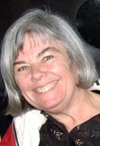 Nancy Harrison Nancy Harrison
cruise & tour specialist
(619) 265-0808

Jewish Sports Trivia Answer: A: (c) Louis “Red” Klotz

SAN DIEGO JEWISH WORLD THE WEEK IN REVIEW
Judaism
We can judge a leader by his followers by Rabbi Leonard Rosenthal in San Diego
San Diego
Danny and Clyde... They lived a lot, and stayed friends since their school days by Donald H. Harrison in San Diego
Adventures in San Diego Jewish History
—July 10, 1947: J.C.R.A
—July 10, 1947: Birdie Stodel B.B.
—July 10, 1947: U.S.O.-J.W.B. Activities
—July 17, 1947: Palomar Camp Plans Completed
Arts
Falstaff a great fall guy in 'Merry Wives' by Carol Davis in San Diego
Famed director Sydney Pollack laughingly agreed to take direction from an amateur by George Falkowitz in Oceanside, California
Chapter 16 of Reluctant Martyr, a serialized novel by Sheila Orysiek in San Diego
Middle East
Negev mayors protest Olmert decision against fortifications along Gaza border by Ulla Hadar in Sderot, Israel
U.S.-Iraq withdrawal negotiations prompt posturing for both countries' electorates by Shoshana Bryen in Washington D.C.
San Diego
San Diego had his dream job and great weather, but Israel had his heart by Donald H. Harrison in San Diego
San Diego Jewish Trivia: Places by Evelyn Kooperman in San Diego
Adventures in San Diego Jewish History
—July 10, 1947: Fund Total Must Be Raised
—July 10, 1947: Registration Opened for Camp Palomar
—July 10, 1947: 'Campers' to Visit Training Center
—July 10, 1947: Lasker Lodge B.B.
Arts
Globe's Romeo and Juliet needs polish by Carol Davis in San Diego
Thursdays with the Songs of Hal Wingard of San Diego
—#51, Waiting for Anne Marie
—#42, Magdalena
—#184, Anne
Middle East
'Gabriel's Revelation' may alter Jewish, Christian concepts of interrelationships by Ira Sharkansky in Jerusalem
Australia
A Roundup of Jewish news in Australia by Garry Fabian in Melbourne
—My grandson's bar mitzvah—and mine
—Shtetl of Zhetl inspires prize-winning essay
—Rabbi Yitzchok Groner dies aged 83
—Jewish groups avoid Diaspora study
—Rabbis oppose euthanasia bill
—Community looks closely at Jewish education cost
—Foreign Affairs Dept. investigates tourist's fate
—Bug's scientific name honors Australian Jew
—Australians to lead at Yad Vashem conference
—Achiever off to Prague
—JLC gets a new home
—Maccabi's winning run continues
—Police called after spiteful football game
San Diego
Scholarly, easy-to-read work tells of San Diego places people are dying to get into by Donald H. Harrison
Adventures in San Diego Jewish History
—July 3, 1947: Jewish Labor Com
—July 3, 1947: Birdie Stodel B.B.
—July 3, 1947: Yo-Ma-Co
—July 3, 1947: Pioneer Women
Arts
All that ends well still can be a problem by Carol Davis in San Diego
Sports
Two Jews in starting All-Star Game lineup by Bruce Lowitt in Clearwater, Florida
Middle East
The cause of freedom, then and now by Shoshana Bryen in Washington, D.C.
Volunteers psychologically counsel people, repair houses in rocket-scarred regionby Ulla Hadar in Kibbutz Ruhama, Israel
San Diego
New Americans Museum celebrates some of this country's richest blessings by Donald H. Harrison in San Diego
Adventures in San Diego Jewish History
—July 3, 1947: Palomar Camp Will Be Site Of Outdoor Activities
—July 3, 1947: Representatives of Agencies Meet in Temple
—July 3, 1947: Day Camp is Popular For Many Children
—July 3, 1947: San Diego Prepares For Post-USO
Arts
Two Yiddish books to tickle the silly bone by Sheila Orysiek in San Diego
Middle East
—Stopping Iran's growing nuclear threat by U.S Congressman Bob Filner in San Diego
Environmentalism
—Sometimes 'brown' is better than 'green' by Sheila Orysiek in San Diego
San Diego
Governor Grille, a kosher meat restaurant, makes its debut at Chabad-University City by Donald H. Harrison in San Diego
Adventures in San Diego Jewish History
—June 26, 1947: Birdie Stodel B.B.
—June 26, 1947: Pioneer Women
—June 26, 1947: Jewish Labor Com.
—June 26, 1947: Jolly Sixteen
Arts
The Joker: from Catskills to Gotham City by Rabbi Simcha Weinstein in New York
Rose burdened with too many thorns by Cynthia Citron in Los Angeles
Middle East
Peres: Peace with Palestinians not possible by Ira Sharkansky in Jerusalem
Judaism
The joy and enthusiasm of new Jews by Rabbi Leonard Rosenthal
The Chofetz Chaim and the Russian soldier by Rabbi Baruch Lederman
Adventures in San Diego Jewish History
—June 26, 1947: Living Memorials For the Dead {Editorial}
—June 26, 1947: Lasker Lodge B.B.
—June 26, 1947: Day Camp's First Week Big Success
Sports
July 4th baseball: Thunder in skies, also in the stands at Storm game in Lake Elsinore by Donald H. Harrison in Lake Elsinore, California
A bissel sports trivia with Bruce Lowitt in Clearwater, Florida
Link to previous editions
< BACK TO TOP
|
|

